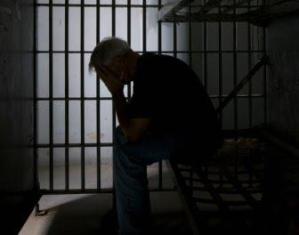I'm not a huge fan of socialism in most things. Not that there aren't social programs that are good, in principle, to protect all citizens from the unpredictable vicissitudes of fate. In general, regrettably, governments tend to do many things poorly and inefficiently (although, as someone who grew up in the Detroit area, I know that big corporations can often be just as lacking in that area as governments, and just as immune to internal correction). However, there is one area of life in which I think it is a complete travesty that there is anything but complete socialization, and that area is the criminal justice system.
I can tolerate the use of privately employed attorneys in civil cases--though just barely, and arguments can be made that money unfairly sways matters even in such venues (Your comments on that notion would be welcome). However, it is utterly unconscionable that private attorneys are ever allowed in the criminal justice system.
Our court system itself is of course utterly antiquated. It has more in common with medieval jousting matches to determine guilt or innocence than it has with any honest attempt to find the truth of any particular matter. In a typical court proceeding, the person who has the best attorney, or team, is the one most likely to win. And that usually means that the person with the most money wins. It's not true universally, of course, but it is a strongly dispositive factor. Consider the O.J. Simpson trial: Would O.J. likely have been acquitted had he been represented by a public defender? I think we can all agree that the answer is "No." Well, why should he have had any better chance of winning than any other man charged with murdering his wife and her friend? Why should a person's individual wealth have any bearing on the quality of defense they receive in a criminal case?
The argument can, and probably will, be made that make all defendants rely on the public defender's office would simply mean that even those with money will face the same ridiculous miscarriages of justice, the same hobbled defense, as a non-wealthy person does when charged with a criminal offense. To this, I say, "Good!" Maybe if a few of the movers and shakers of society realize just how horrible the situation is for a non-wealthy person who is charged with any crime in America, they will see to it that changes are made. Maybe they will see to it that defendants in criminal cases get at least as many resources applied to them as the prosecutor's office has to bring to bear (and do recall that the prosecution has not only the power of their office, but also that the resources of all pertinent police forces are more or less at their disposal...something that certainly cannot be said for any defendant).
The hallmark of our criminal justice system is supposed to be that a person is innocent until proven guilty beyond a reasonable doubt. Given that presumption, we must be scrupulous to err on the side of the defendant. The state has tremendous, monolithic power, and can destroy the lives of citizens almost with impunity by means of simply bringing a criminal prosecution, whatever the outcome. Given this fact, and the supposed basis of our criminal justice system, all biases should be in favor of the accused. Clearly this is not the case; if it were, the United States would not have five times its share of the world's prisoners based on population...the largest number of prisoners in absolute numbers and per capita. This is to say nothing of the outrageous inequality in the application of criminal justice to minorities. This would be at least partly rectified by having the wealthy receive the same defense as the poor, since minorities, in general, are less likely to be wealthy than their counterparts.
Of course, the privatization of prisons absolutely has to stop as part of this process. It appears simply impossible for inappropriate bias not to be introduced into a system when a for-profit interest becomes involved in it (See the ACLU's report from 2012 here). In general, I see government itself as a necessary evil, but it is necessary, precisely because human nature has not yet reached a state of development where we can be trusted to do many things honestly and justly if our personal interests are engaged. But when we give our governments certain powers, and those powers are then put at the disposal of private interests, who have their own monetary gain at heart rather than the achievement of actual justice, it is perfectly predictable for disaster to occur.
How comfortable would we all be if police departments were privately run? What if the degree of one's protection by law enforcement were overtly and explicitly dependent upon one's financial power (as opposed to being only implicitly so, as it is now)? How safe would you feel? What if you had to pay a fee for services, or pay to become a member of some club in order to have the police investigate, say, your stolen car...or the murder of one of your family members? I think we can all agree that this is not a system under which we would hope to live, where the power of law enforcement works only for the highest bidder.
So, why should the quality of a person's defense against charges of crime be dependent upon the financial resources one can bring to bear? Even if it were true that every person's financial status were dependent upon the quality of their character and their personal ability, even if all fortunes were honestly and openly made in truly fair trade--a notion that veers away from mere fiction into the realm of wildest fantasy--there would still be no justification for giving the financially successful better defense against charges of criminal activity than a person who was not successful. There is no data to demonstrate that financial success is inversely correlated with degree of criminality, and in reality, the correlation is often a positive one.
Of course, depriving individuals of the ability to hire their own criminal defense attorneys would further drain the budgets and other resources of our court systems; this would be a good thing. It would help force us, as a society, to do a better job of prioritizing our application of police and prosecutorial (and thus also defense) resources--to decide how important it was, for example, to arrest people for possession of marijuana or even of more powerful drugs, when they have not taken any action that brings harm to any other person. Needless to say, in applying such a policy, we must avoid the pitfall of simply increasing the use of plea bargaining to deal with such resource burdens, since that system is, by nature, biased and unjust, a criminal process in its own right (see my blog on the subject here).
The changes I call for are drastic, I know. I don't apologize for that, and I will likely continue to call for even more such changes as time goes by. Our system is drastically malfunctioning, drastically inefficient, and drastically unjust. It must be changed, overhauled, or completely replaced with something better, if we wish to have the right to continue to call America a free society.






